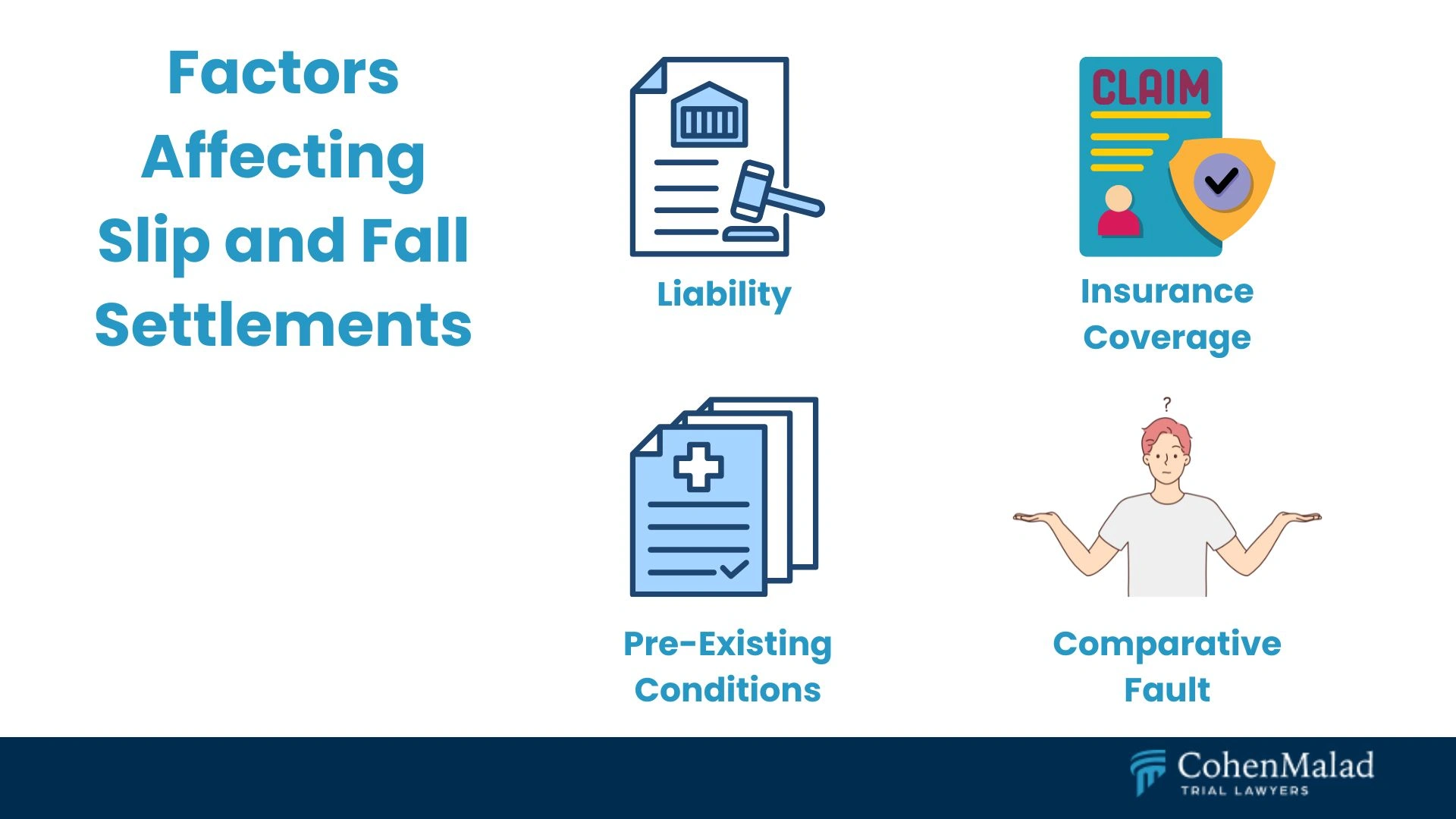One moment you're walking normally — the next, you're on the ground in pain, facing the prospect of steep medical bills and lost income.
As experienced slip and fall lawyers, the legal professionals at CohenMalad, LLP, understand your concern about what your case might be worth, especially when dealing with insurance companies that might seek to downplay the situation.
What is the average slip and fall settlement amount in Indiana? The truth is, it’s difficult to provide a single, typical amount. While most settlements range from $10,000 to $50,000, serious injuries involving brain trauma or spinal damage can result in significantly higher amounts.
Rather than focusing on an average figure that may not apply to your unique situation, it's more helpful to understand what factors might influence your potential compensation.
What Factors Influence Slip and Fall Settlements?
Several key considerations can impact how much your slip and fall case might be worth. Here are a few important ones to be aware of.

Liability
To recover compensation, you must prove the property owner was negligent by showing the following:
- A hazardous condition existed on the property
- The owner knew or should have known about the hazard
- The owner failed to fix the hazard or warn about it
- This negligence directly caused your injuries
Under Indiana premises liability law, your status on the property (as either invitee, licensee, or trespasser) affects the duty of care the proprietor or manager owes you.
Insurance Coverage
Insurance coverage plays a major role in slip and fall settlements, just as it does in car accident cases. If a business or property owner is at fault, their liability insurance will typically cover your claim, though their policy limits may not fully address severe injuries. If you’re facing extensive losses that exceed these limits, a lawyer can identify additional sources of compensation.
Pre-Existing Conditions
While having pre-existing medical conditions won’t necessarily prevent recovery, it could complicate your case. The insurance companies may try to argue that your pain stems from past conditions rather than the fall itself.
State law recognizes the "eggshell skull rule”, which means an at-fault property owner will be liable for any injuries you sustain due to their negligence, even if those injuries are exacerbated by a pre-existing condition.
Comparative Fault
Indiana follows a modified comparative fault rule. This rule essentially says that you can recover damages if you're less than 51% responsible for your accident, though your compensation will be reduced by your assigned percentage of fault. For example, if you were awarded $100,000 for your injuries but were found to have been 25% at fault, you would receive $75,000.
Types of Damages Available in Slip and Fall Cases
Indiana law allows injured parties to pursue several types of damages following a slip and fall accident, including the following.
Medical Expenses
Medical costs often form the foundation of slip and fall settlements. They may include hospital bills, emergency room costs, doctor visits, consultations, surgery costs, medication expenses, physical therapy, and future medical treatment related to your injuries. Courts consider both current medical bills and anticipated future costs when determining compensation.
Slip and Fall Settlements with Surgery
Slip and fall settlements involving surgery expenses often exceed $50,000 due to higher medical costs and longer recovery periods. Examples of potential surgeries include spinal fusion, joint replacement (especially knee, hip, or shoulder), fracture repair, and ligament/tendon repair (ACL, rotator cuff, etc.).
Incidental Expenses
Some additional costs directly resulting from your injuries might include:
- Transportation to medical appointments
- Modifications to your home or vehicle
- Assistive devices
- In-home care services
- Household help
Make a point of keeping receipts for all expenses related to your injury to ensure full reimbursement.
Lost Wages and Benefits

If your injuries prevent you from working, you may stand to claim:
- Wages lost during recovery
- Lost benefits like paid time off or health insurance contributions
- Decreased earning capacity if you can’t return to your previous position
These calculations become more complex for self-employed individuals or those with variable income.
Non-Economic Damages
Beyond financial losses, Indiana law recognizes the personal and emotional toll of injuries, which may take the following forms:
- Pain and suffering
- Emotional distress
- Loss of enjoyment of life
- Disfigurement
- Loss of consortium (impact on personal relationships)
These damages can be substantial but require thorough documentation and skilled legal representation to prove.
Punitive Damages
In rare cases where a property owner acts with gross negligence or willful disregard for visitor safety, courts may award punitive damages. Indiana law caps these damages at either $50,000 or three times the amount of compensatory damages, whichever is greater.
Steps for Filing a Slip and Fall Claim in Indiana

Taking the right steps after a fall can significantly improve your chances of fair compensation. Here’s what to do (and what not to do).
Get Medical Help
Seeking immediate medical care should be your first priority. Even if you think you’re unhurt, some serious injuries can have delayed symptoms. Moreover, your medical records will provide crucial evidence linking your injuries to the fall.
Document the Fall
You can strengthen your claim with detailed documentation. Focus on:
- Taking photos of the accident scene and the hazardous condition
- Getting contact information from witnesses
- Saving clothing and shoes worn during the fall
- Keeping a daily journal describing your pain levels and limitations
Preserve All Relevant Evidence
Indiana's statute of limitations gives you two years from the date of injury to file a legal claim. During this time:
- Don't repair or clean any items damaged in the fall
- Save all medical bills, prescriptions, and healthcare records
- Track all expenses related to your injury
- Document communications with property owners or insurance companies
Hire a Lawyer
Working with a reputable lawyer with experience managing slip and fall cases can lead to a better outcome in your case. Your attorney can assist you by:
- Properly valuing your claim
- Gathering necessary evidence
- Handling communications with insurance companies
- Negotiating a fair settlement
- Representing you in court if needed
Let Us Help You Fight for the Compensation You Deserve
Slip and fall accidents can have long-lasting repercussions for your health, finances, and quality of life. The skilled personal injury lawyers at CohenMalad, LLP, understand the challenges you're up against and are ready to help you secure the compensation you need to move forward.
Our firm is dedicated to helping Indiana residents recover fair settlements for preventable injuries. We know how to counter underhanded insurance company tactics and build compelling cases that get results.
Don't face this difficult time alone. Contact us today for a free initial consultation to discuss your slip and fall case and learn more about how we can pursue the crucial resources you need.

Contact CohenMadlad, LLP, to Get the Legal Support You Need
Don't settle for less than what your case is worth. Our capable Indianapolis slip and fall attorneys will work to secure the maximum possible compensation for your situation.





.svg)